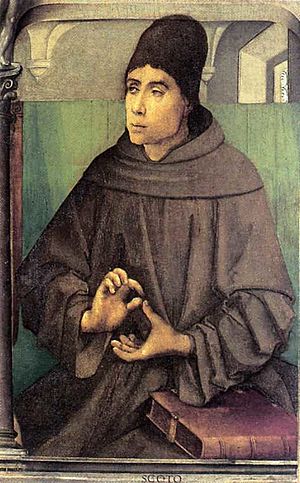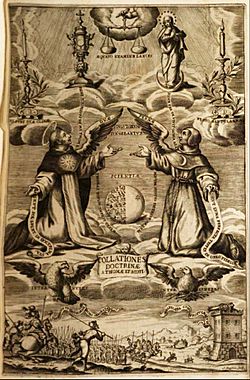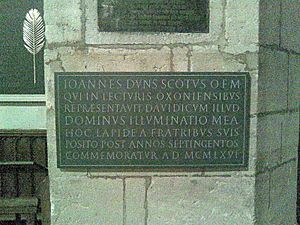Duns Scotus facts for kids
Quick facts for kids
Blessed
John Duns Scotus
OFM
|
|
|---|---|

Portrait of Duns Scotus
|
|
| Born | c. 1265/66 |
| Died | 8 November 1308 (aged c. 42) |
| Alma mater | University of Oxford |
| Era | Medieval philosophy |
| Region | Western philosophy |
| School | Scholasticism Scotism Aristotelianism Theological voluntarism Philosophical realism Medieval realism (Scotistic realism) |
|
Main interests
|
Metaphysics, theology, logic, epistemology, ethics |
|
Notable ideas
|
Univocity of being Formal distinction Theological voluntarism Haecceity as a principle of individuation Scotistic realism Immaculate Conception of the Virgin Mary |
|
Influenced
|
|
| Blessed John Duns Scotus OFM |
|
|---|---|

Duns Scotus and Thomas Aquinas
|
|
| Born | c. 1265/66 Duns, Berwickshire, Scotland |
| Died | 8 November 1308 (aged 41–42) Cologne, Holy Roman Empire |
| Venerated in | Catholic Church |
| Beatified | 20 March 1993, Vatican City by Pope John Paul II |
| Major shrine | Franciscan Church, Cologne, Germany |
| Feast | 8 November |
| Attributes | Books, a vision of the Blessed Virgin Mary, the moon on the chest of a Franciscan friar |
| Patronage | Academics, Cologne, Germany, apologies, scholars, student, theologians and philosophers |
John Duns Scotus (around 1265/66 – 8 November 1308) was a Scottish Catholic priest. He was also a Franciscan friar, a university professor, a philosopher, and a theologian. People often called him Duns Scotus.
He is known as one of the four most important Christian thinkers of Western Europe during the High Middle Ages. The others were Thomas Aquinas, Bonaventure, and William of Ockham.
Scotus had a big impact on both religious and non-religious ideas. Some of his most famous ideas include "univocity of being" (that existence is a basic idea for everything). He also taught about the "formal distinction" (a way to see different parts of the same thing). Another key idea was "haecceity" (what makes each thing unique).
He also created a detailed argument for God's existence. Scotus strongly supported the idea of the Immaculate Conception of Mary. This means he believed Mary was born without sin.
Because of his deep and careful thinking, Duns Scotus was given the nickname Doctor Subtilis, which means "the subtle doctor". Pope John Paul II declared him "Blessed" in 1993.
Contents
Life of Duns Scotus
Not much is known about Duns Scotus's early life. He was likely born between December 1265 and March 1266. His family was important in the area of Duns, Scotland.
A stone monument, called a cairn, now marks his birthplace. Franciscan friars built it in 1966. This was to celebrate 700 years since his birth.
Duns Scotus became a Franciscan friar in Dumfries. His uncle, Elias Duns, was a leader there.
We know for sure that he became a priest on March 17, 1291. This happened in Northampton, England. To become a priest, you had to be at least 25 years old. This helps us guess his birth year.
His name, "Johannes Duns," means "John from Duns." This suggests he came from the town of Duns in Scotland.
He probably studied at a Franciscan school in Oxford, England. This school was linked to the University of Oxford. Around 1300, he was in Oxford. He was listed among friars who could hear confessions.
Later, around 1302, he started teaching at the famous University of Paris. But he was expelled from Paris. This happened because he supported Pope Boniface VIII. The Pope was in a disagreement with King Philip IV of France.
Duns Scotus returned to Paris by 1304. He taught there until 1307. Then, for unknown reasons, he was sent to a Franciscan school in Cologne, Germany.
He died suddenly in Cologne in November 1308. His tomb is in the Church of the Friars Minor there. A Latin poem on his tomb says:
- "Scotland brought me forth.
- England sustained me.
- France taught me.
- Cologne holds me."
A story says he was buried alive. But this is probably just a myth.
His Important Writings
Scotus's most important work is his commentary on the Sentences by Peter Lombard. This book contains almost all of his famous philosophical ideas. These include his ideas about existence, unique individuals, and God.
He wrote different versions of this commentary. The main one is called the Ordinatio. This was a revised version of his lectures at Oxford. He also wrote notes for his lectures, called the Lectura. Another version, the Reportatio parisiensis, came from his lectures in Paris.
In Scotus's time, these "commentaries" were not just simple explanations. They used Lombard's text as a starting point. This allowed Scotus to discuss deep theological and philosophical questions. For example, he used a question about angels to discuss how things can be unique.
Scotus also wrote philosophical and logical works early in his career. These included commentaries on Aristotle's writings. His commentary on Aristotle's Metaphysics was found again recently.
He also wrote 46 short discussions called Collationes. Another work was on natural theology, called De primo principio. His Quaestiones Quodlibetales were also important.
Some works were once thought to be by Scotus but were not. For example, a logical work called De modis significandi was actually by Thomas of Erfurt.
Scotus's Main Ideas
What is Real?
Scotus believed in something called "Scotistic realism". This means he thought that general ideas, like "humanity," are real. They exist both in actual things (like a person) and in our minds. He believed that things share a "common nature." For example, all humans share the nature of "humanity."
What Makes Things Unique?
Scotus had a special idea about what makes each individual thing unique. He called this "haecceity" (say: HECK-see-it-ee). It means the "thisness" of something. It's the special quality that makes one thing different from all others. For example, your "haecceity" is what makes you, uniquely you.
Different Aspects of One Thing
He also talked about a "formal distinction". This is a way to tell apart different aspects of the same thing. These aspects are always together in reality. But their definitions are not exactly the same. It's like how a person can be both a student and a friend. They are the same person, but these are different roles.
God's Will and Human Freedom
Scotus is known for his idea of "theological voluntarism." This means he strongly believed in God's powerful will. He also emphasized human freedom. He thought God's will was the most important thing. This also meant humans have true freedom to choose.
Mary and the Immaculate Conception
One of Duns Scotus's most famous ideas was his strong defense of the Immaculate Conception of Mary. This means he believed that Mary, the mother of Jesus, was conceived without original sin.
At that time, many thinkers disagreed on this topic. They wondered how Mary could be free from sin if everyone needed Jesus to remove sin. Scotus used a simple idea: "potuit, decuit, ergo fecit." This means, "God could do it, it was fitting, therefore He did it."
Scotus argued that Mary needed to be saved like everyone else. But, because of Jesus' future sacrifice, God saved her from sin at the very moment she was conceived. This was a special grace given to her in advance.
This idea was very important. It was later used by Pope Pius IX in 1854. The Pope officially declared the Immaculate Conception a dogma (a central belief of the Catholic Church).
Scotus also believed in the "universal primacy of Christ." This idea means Christ is supreme over all creation. This teaching later helped create the feast of Christ the King in 1925.
Being Declared Blessed
Duns Scotus has long been honored as a "Blessed" person by the Franciscan Order. He was also honored in the cities of Edinburgh and Cologne.
In 1991, Pope John Paul II declared him "Venerable." Then, on March 20, 1993, the Pope officially recognized his special honor. This meant he was formally declared "Blessed."
His Impact and Legacy
Later Times
Because Duns Scotus died young, he left many writings unfinished. His students helped organize and edit his works. Sometimes, his writings were mixed up with others.
In the 14th century, Scotus's ideas became very popular. Franciscan thinkers were often divided into "Scotists" (followers of Scotus) and "Ockhamists" (followers of William of Ockham).
The Word "Dunce"
During the 16th century, Scotus's reputation suffered. His followers, called "Dunses," argued against new ideas of the Renaissance. Because of this, the word "dunce" became a negative term. It was used to describe someone who was not smart or could not learn.
Despite this, Scotism continued to grow in Catholic parts of Europe. His works were printed many times. His ideas were very popular in the early 17th century. Many universities had special professors who taught Scotus's ideas.
Modern Interest
In the 20th century, people became interested in Scotus again. Many philosophers and theologians studied his ideas.
Today, Scotus is seen as a very important Franciscan theologian. He is still known as "Doctor Subtilis" for his very detailed and careful thinking.
Some modern thinkers believe Scotus's ideas changed how people thought about "being" (existence). They see his work as a step towards "modernity." However, other scholars disagree. They argue that Scotus's ideas about "univocity of being" were more about how we understand concepts, not about how reality itself works.
In Movies
In 2012, a movie about Duns Scotus was made. It was called Blessed Duns Scotus: Defender of the Immaculate Conception. It focused on his debates at the University of Paris. It also showed parts of his childhood.
See also
 In Spanish: Juan Duns Scoto para niños
In Spanish: Juan Duns Scoto para niños
- Oxford Franciscan school
- William of Ware
 | John T. Biggers |
 | Thomas Blackshear |
 | Mark Bradford |
 | Beverly Buchanan |


